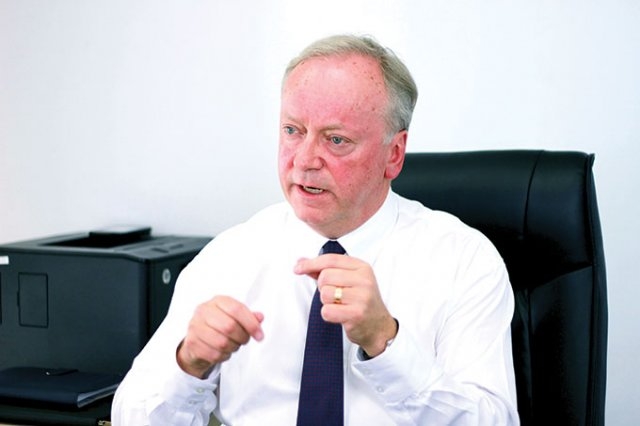Mr. David Cruickshank, Deloitte Global Chairman, discusses what’s needed for Vietnam to move forward in global trade and investment.

Mr. David Cruickshank, Deloitte Global Chairman
■ The APEC Summit was seen as a golden opportunity for Vietnam to promote trade and investment. What suggestions would you make to the Vietnamese Government and local enterprises to turn these opportunities into actual advantages?
APEC showcased Vietnam very well. There were roughly 2,000 business leaders in Da Nang, where they heard from your President and heard about the business environment in Vietnam.
Now, converting that into business for Vietnam is a big thing. I think that for both Vietnamese companies expanding overseas and overseas companies expanding here, the opportunities in Vietnam are because its population, technology, and education system are big and I think there were a lot of conversations taking place around the meeting about investment opportunities in Vietnam.
Even though we go back with different views about Vietnam, any big meeting like that has a really positive multiplier effect. It doesn’t always happen immediately, but people will look at business plans differently and investment opportunities differently.
I think the trick now is to make sure there is follow up, between businesses and the government, to make sure that the infrastructure is right, the incentives are right, and so on, but there was a lot of enthusiasm at APEC about Vietnam, so everyone in Vietnam should be very encouraged by that.
■ What can Deloitte do to support Vietnamese enterprises to take advantage of these opportunities and gain success?
I think the biggest area where we like to help clients is to help them expand overseas, looking at opportunities for them, giving them advice on how not to make mistakes by making good investments, having good structures, taking advice.
Because every country in the world is different. I’m originally from the UK, and doing business in the UK is different from doing business in the US, and the same for Vietnam and China.
So, I think the most important thing is to get advice, work with local expertise so you can get the best out of the overseas market that the Vietnamese companies are expanding into.
■ Many Vietnamese enterprises have recently expanded their business globally. Do you have any advice on what they should take note of when investing overseas?
The world has become much smaller, and I think that generally, despite some of the political noise around the world, countries are very receptive to investors from other countries when they are bringing new skills, new products, and new ideas, so I think Vietnamese companies, as far as I’m concerned, will be well received by the majority of other countries around the world.
But, as I said earlier, I think they should take time and take care to make sure their investments are structured in the right way and that they have joint ventures with the right partners and that they take care to understand the environments they are working in, so they can avoid making mistakes and get the best out of the opportunities.
■ As a global expert on tax and customs, do you have any recommendations for the Vietnamese Government on improving the business environment to attract more foreign investment?
Vietnam has been doing well on various competitive indexes, including the World Bank’s Ease of Doing Business index and the World Economic Forum’s competitive index, and I know that recently the government and the Ministry of Industry and Trade have relaxed a lot of rules to make sure that it is easier to do business, so I think I would encourage the continuation of that.
The other general point that I would make is that what businesses like to see is consistency in policy.
They don’t like dramatic changes because the investments that businesses make often span many decades, and even the shorter-term ones are certainly many years, and they like to be able to predict what the outcomes will be.
Therefore, I think certainty in policymaking and consistency in policymaking are important, and when there are changes because the government has to make changes, businesses should be consulted on those changes to make sure they can be implemented in a smooth way.
I think that’s one of the biggest things that I heard from businesses - consistency in policy consultation around policy changes, and that is really important.
■ With a handful of new generation foreign trade agreements (FTAs), what does globalization mean for Vietnam?
I think the big advantage of Vietnam’s strategy is its increasing regulation and open market, and many major multinationals have operations here already, so the connections are already made.
But I think you have got this huge domestic market potential as well as a population pyramid, with lots of young people coming through who are all going to be consuming more and that big population gives a huge opportunity for companies to develop here.
Countries with an aging population, I’m thinking of Europe now, have an ageing population and demographics that aren’t that attractive compared to Vietnam.
■ What do you think about the in-principle agreement on the Comprehensive and Progressive Agreement for the Trans-Pacific Partnership (CPTPP) without the participation of US?
Some analysis I have read showed that Vietnam would be one of the biggest beneficiaries of the TPP because of its ability to trade further than it can at the moment.
Trade agreements are really hard and I think it should be taken one step at a time, as there are many issues that each country has to take.
There are huge benefits for free trade, huge benefits for globalization, and we have seen that all over the world.
I think we need to talk a lot more about those benefits, while we also need to recognize the challenges for those who are left behind.
VN Economic Times